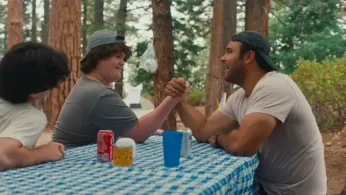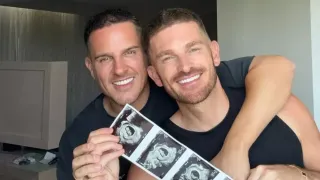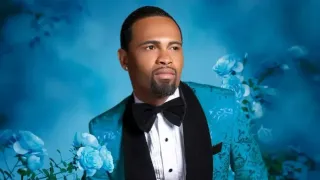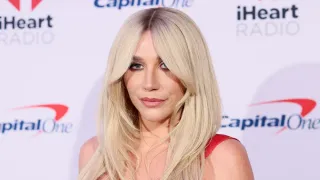
6 hours ago
Corey Sherman’s Heartfelt Gay Coming-of-Age Film "Big Boys" Champions Queer Self-Acceptance
READ TIME: 3 MIN.
“Big Boys,” directed by Corey Sherman, delivers a fresh, genuine, and funny take on the gay coming-of-age story. The film follows Jamie, a teenage boy navigating a weekend camping trip that sparks unexpected crushes, awkward self-discovery, and moments of both hilarity and tenderness. At its core, “Big Boys” is a celebration of queer identity, body positivity, and the transformative power of embracing one’s true self .
In an interview with Attitude Magazine, Corey Sherman shared that “Big Boys” was inspired by his own formative experiences as a queer youth—specifically, the “private” feelings of desire for straight friends, older men, and teachers. Sherman recalled, “I wanted to make a movie that put all that stuff out in the open,” emphasizing that the experience of queer desire, even when unrequited, is “worthwhile and transformative” .
Sherman’s aim was to offer a narrative that validates feelings often left unspoken in mainstream media. He explained, “Just because it doesn’t match up with what you see your peers having, or in movies where straight characters come together, doesn’t mean it isn’t valid.” His film addresses internalized homophobia and the loneliness that can accompany queer adolescence, highlighting their universality and importance .
A distinctive feature of “Big Boys” is its honest portrayal of body image and self-acceptance. The film’s protagonist, Jamie, is portrayed as a “big kid” struggling with both his sexuality and body confidence. Sherman, who experienced bullying and body shaming as a child, was determined to challenge harmful stereotypes by “making Jamie a fully-developed, nuanced character instead of a stereotype” .
Sherman explained, “I always saw overweight men portrayed as the butt of the joke, which subconsciously delivered the message that there is nothing powerful or attractive about them.” By contrast, “Big Boys” gives viewers characters like Dan—Jamie’s crush—who is “large but confident in his body” and teaches Jamie to embrace himself, regardless of what society expects .
The film’s gentle handling of fatness is earning praise from critics. Attitude Magazine’s review calls it “a refreshing portrait of young queerness,” highlighting the film’s subtle, non-patronizing approach to Jamie’s body image struggles .
“Big Boys” is packed with comedic moments that balance its introspective tone. From “camping shower cruising thoughts” to first crushes, erection mishaps, and Jamie’s earnest journaling about why he “can’t be gay” (he has no interest in fashion, so surely it’s impossible), the film finds humor in the universal awkwardness of adolescence—while grounding these moments in a distinctly queer perspective .
Corey Sherman told Attitude Magazine he wanted the film to be “a tender, feel-good story of identity and body image,” offering viewers laughs while also inviting them to reflect on their own journeys toward self-acceptance .
Sherman’s intention with “Big Boys” is to encourage LGBTQ+ youth—especially those who feel different or marginalized—to “be confident in their own skin, whether that is sexuality, body image or who they fancy.” He hopes the film’s depiction of Jamie’s journey will inspire others to embrace their identities without shame or fear .
He notes that body shaming is often discussed as a “women’s issue,” but that “young people of all genders are susceptible to body image issues, particularly now when there is an endless well of images to compare ourselves to online.” By centering male role models like Jamie and Dan, “Big Boys” encourages viewers to stop comparing themselves to others and instead celebrate their own unique bodies and desires .
“Big Boys” has been greeted with critical acclaim for its warmth, comedic energy, and authentic portrayal of queer adolescence. Attitude Magazine gave the film 4 out of 5 stars, describing it as an “instant crowdpleaser, heartwarming and sweetly comedic” .
The film’s success points to a growing appetite for stories that reflect the diversity of LGBTQ+ experiences—not just in terms of sexuality, but also body type, self-image, and the complexity of coming out in a world that often feels unwelcoming. Sherman’s hope is that “Big Boys” will continue to spark conversations about these issues and help LGBTQ+ audiences feel seen and understood .
Sherman credits his creative team, including producer Allison Tate—an active member of the Los Angeles LGBTQ+ community and a filmmaker for EqualPride—for helping ensure the film’s authenticity and impact. Tate’s experience in queer media contributed to the project’s emotionally resonant storytelling and commitment to representing the community honestly.
As “Big Boys” continues its run in cinemas and at festivals like BFI Flare, its message resonates: queer stories matter, and every LGBTQ+ young person deserves to see themselves represented as fully human—worthy of love, laughter, and self-acceptance. In the words of Corey Sherman, the “queer coming-to-terms, facing unrequited love, internalised homophobia—these things that can feel scary and lonely—are actually common experiences and worthy of their own story” .






